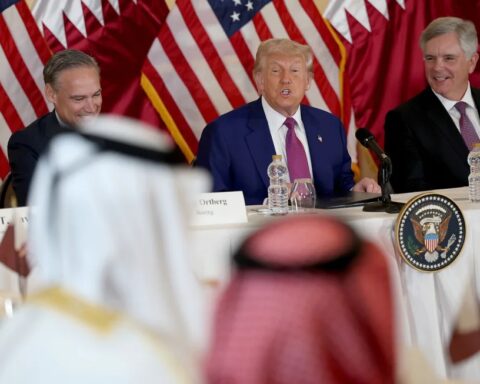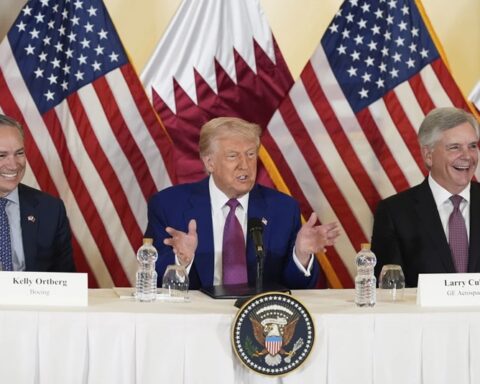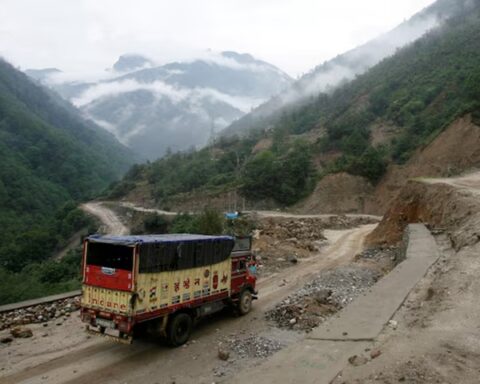SRINAGAR, India, October 16, 2024 (AP) — Leaders of the biggest political party of Kashmir were sworn into office Wednesday to run a largely powerless government after the first local election since India stripped the disputed region of its special status five years ago.
National Conference leader Omar Abdullah will be the region’s chief minister after his party won the most seats in the three-phased election. It has support from India’s main opposition Congress party, although Congress decided not to be a part of the new government for now.
The vote was Kashmir’s first in a decade and the first since Prime Minister Narendra Modi’s Hindu nationalist government scrapped the Muslim-majority region’s long-held semi-autonomy in 2019. The National Conference staunchly opposed the move, and its victory is seen as a referendum against the Modi government’s changes.
Kashmir will remain under New Delhi’s direct control
Lt. Gov. Manoj Sinha, New Delhi’s top administrator in Kashmir, administered the oaths of office to Abdullah and the five members of his council of ministers in a ceremony under tight security at a lakeside venue in the region’s main city of Srinagar. Some of India’s top opposition leaders, including Rahul Gandhi of the Congress party, attended.
However, there will be a limited transfer of power from New Delhi to the local government as Kashmir will remain a “union territory” — directly controlled by the federal government — with India’s Parliament as its main legislator. Kashmir’s statehood would have to be restored for the new government to have powers similar to other states of India.
India and Pakistan each administer a part of Kashmir, but both claim the territory in its entirety. The nuclear-armed rivals have fought two of their three wars over the territory since they gained independence from British colonial rule in 1947.
Modi congratulated Abdullah and promised to work closely with him and his team.
Aga Syed Ruhullah Mehdi, a parliamentarian from Kashmir and a National Conference leader, said the new setup in Kashmir “will act both as a government and as an opposition” as it will oppose policies of Modi’s party while also strive to “reclaim” the region’s rights.
“These policies have harmed the state, such as the revocation of Article 370, which stripped us of the rights we enjoyed. The government will deliver effective governance while fighting for the rights of the state,” he said.
Tight restrictions on media and civil rights
Kashmir’s last assembly election in 2014 brought to power Modi’s Bharatiya Janata Party, or BJP, which for the first time ruled in a coalition with the local Peoples Democratic Party. T he government collapsed in 2018, after the BJP withdrew from the coalition and New Delhi took the region under its direct control.
A year later, the federal government downgraded and divided the former state into two centrally governed union territories, Ladakh and Jammu-Kashmir. The move — which largely resonated in India and among Modi supporters — was mostly opposed in Kashmir as an assault on its identity and autonomy amid fears that it would pave the way for demographic changes in the region.
The region has since been on edge with civil liberties curbed and media freedoms restricted.
Like on election days, authorities on Wednesday limited access of foreign media to the oath ceremony and denied press credentials to most journalists working with international media, including The Associated Press, without citing any reason.
In the recently concluded election, the National Conference won 42 seats, mainly from the Kashmir Valley, the heartland of the anti-India rebellion, while the BJP secured 29 seats, all from the Hindu-dominated areas of Jammu. The Congress succeeded in six constituencies.
Militants in the Indian-controlled portion of Kashmir have been fighting New Delhi’s rule since 1989. Many Muslim Kashmiris support the rebels’ goal of uniting the territory, either under Pakistani rule or as an independent country.
India insists the Kashmir militancy is Pakistan-sponsored terrorism. Pakistan denies the charge, and many Kashmiris consider it a legitimate freedom struggle. Tens of thousands of civilians, rebels and government forces have been killed in the conflict.
Calls to restore Kashmir’s statehood
Experts say the new government, stripped of all the essential powers, would face a daunting task to fulfil its election promises against huge public expectations to resist the 2019 changes and the federal government’s tight control.
Praveen Donthi, senior analyst with the International Crisis Group, said the region’s political vacuum of the last few years will not vanish with the polls alone.
“The Modi government should build on it by restoring full statehood and empowering the government,” said Donthi. “Otherwise, it will intensify disaffection and is a set up for failure.”
Modi and his powerful home minister, Amit Shah, have repeatedly stated that the region’s statehood will be restored after the election, without specifying a timeline. However, they vowed to block any move aimed at undoing the 2019 changes but promised to help in the region’s economic development.
For the new chief minister, meanwhile, it’s going to be a tightrope walk.
“As a pro-India politician at the helm of this powerless administration, Omar Abdullah knows his limitations,” Donthi said. “He would be looking at his job as a buffer to moderate the worst instincts of New Delhi, but he would be clutching at straws.”





